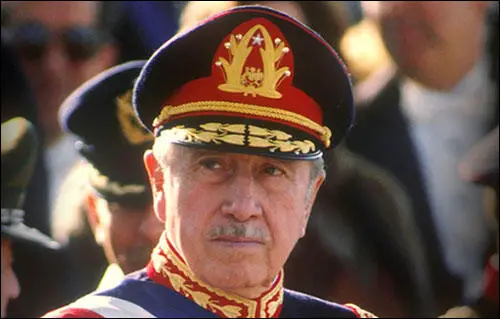On this day on 16th October
On this day in 1859 John Brown, a strong opponent of slavery, led a party of 21 men in a successful attack on the federal armory at Harper's Ferry. Brown hoped that his action would encourage slaves to join his rebellion, enabling him to form an emancipation army. Two days later the armory was stormed by Robert E. Lee and a company of marines. Brown and six men barricaded themselves in an engine-house, and continued to fight until Brown was seriously wounded and two of his sons had been killed.
John Brown was tried and convicted of insurrection, treason and murder. He was executed on 2nd December, 1859. Six other men involved in the raid were also hanged. The song, John Brown's Body, commemorating the Harper's Ferry raid, was a highly popular marching song with Republican soldiers during the American Civil War.
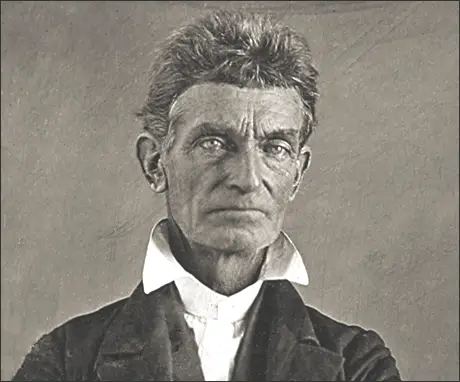
On this day in 1861 Margaret Llewelyn Davies, the daughter of J. Llewelyn Davies, was born at Kirkby Lonsdale, Westmorland. Her father was a Christian Socialist and a strong supporter of women's rights. After attending Girton College, Cambridge, Llewelyn Davies became involved in several progressive causes.
Llewelyn Davies joined the Women's Co-operative Guild (WCG) and for thirty-two years was the organisation's General Secretary. Under her leadership the WCG became a campaigning organisation. After carrying out an investigation into the working conditions of the 2,000 women employed in co-operative stores, the WCG advocated the introduction of a minimum wage. By 1912 the Co-operative Wholesale Society and 200 other retail societies had complied with the WCG's policy on wages.
A member of the National Union of Suffrage Societies (NUWSS), Llewelyn Davies took part in several peaceful demonstrations, including a sandwich-board picket of the House of Commons in 1912. She also gave evidence to the Royal Commission on divorce reform and the Women's Co-operative Guild created great controversy by urging that divorce by mutual consent after two years separation should be legalized.
Other campaigns instigated by Llewelyn Davies included an attempt to reduce the high infant-mortality rates by the introduction of improved ante-natal, natal, and post-natal care. These views were expressed in her book, Maternity (1915). Other books included, Life as We Have Known It (1931).
Margaret Llewelyn Davies died on 28th May 1944.
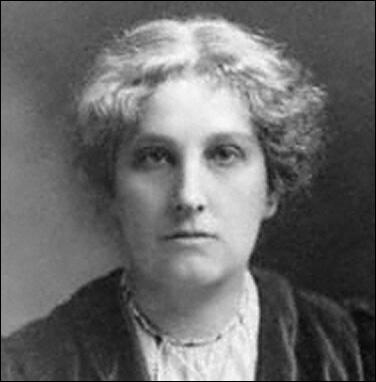
On this day in 1869 Girton College is founded, becoming England's first residential college for women. Two leaders of the feminist movement, Emily Davies and Barbara Bodichon raised enough money to purchase Benslow, a house two miles outside Cambridge. In 1873 Benslow House was opened as Girton College.
The two women held different views on women's education. Davies believed that the students should concentrate on traditional subjects such as classics and mathematics whereas Bodichon wanted a more radical approach to the curriculum. The two women also disagreed on student discipline. Davies favoured a strict regime compared to Bodichon's more liberal approach. Davies also insisted that the new college must be affiliated to the Church of England. Students at Girton included Helena Swanwick, Eileen Power, Dora Russell, Hertha Ayrton, Helena Swanwick, Margaret Llewelyn Davies, Margaret Cole and Dorothy Jewson.
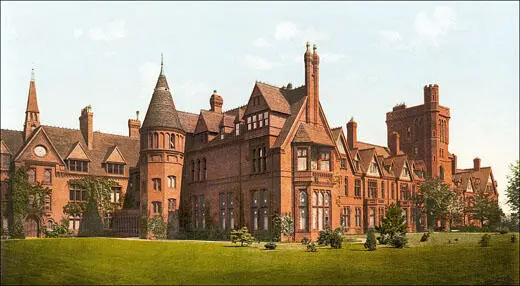
On this day in 1903 Elizabeth Wolstenholme-Elmy organized the National Convention for the Civil Rights of Women held at the Holborn Town Hall. It was attended by 200 delegates.
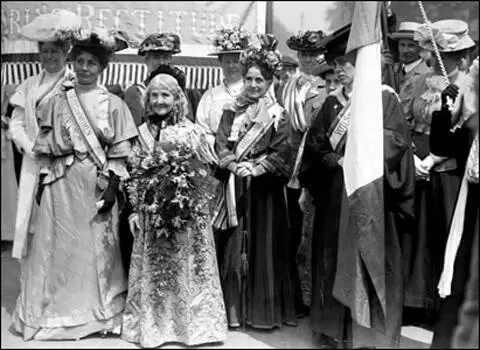
On this day in 1916 Margaret Sanger, with the help of Kitty Marion, opened the first family planning clinic in the United States. It was raided nine days later by the police and Sanger served 30 days in prison. In 1917 she published What Every Mother Should Know. Ernest Gruening, the editor of The Nation, was one of Sanger's greatest supporters and joined her campaign to distribute birth-control literature. When Patrick Hayes, the Archbishop of New York, condemned Sanger's attempts to hold a meeting in the city on the subject, he commented that "I am confident that in this great city of ours the majority of the women are too pure, clear-minded and self-respecting to want to attend or hear a discussion of such a revolting subject."
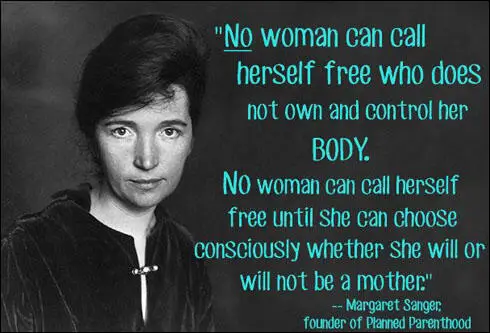
On this day in 1919, Adolf Hitler delivers his first public address at a meeting of the German Worker's Party (GWP). Formed by Anton Drexler, Hermann Esser, Gottfried Feder, Karl Harrer and Dietrich Eckart, the German Army was worried that it was a left-wing revolutionary group. Harrer was elected as chairman of the party. Alan Bullock, the author of Hitler: A Study in Tyranny (1962) has pointed out: "Its total membership was little more than Drexler's original forty (Committee of Independent Workmen), activity was limited to discussions in Munich beer-halls, and the committee of six had no clear idea of anything more ambitious."
Hitler recorded in Mein Kampf (1925): "When I arrived that evening in the guest room of the former Sternecker Brau (Star Corner)... I found approximately 20–25 persons present, most of them belonging to the lower classes. The theme of Feder’s lecture was already familiar to me; for I had heard it in the lecture course... Therefore, I could concentrate my attention on studying the society itself. The impression it made upon me was neither good nor bad. I felt that here was just another one of these many new societies which were being formed at that time. In those days everybody felt called upon to found a new Party whenever he felt displeased with the course of events and had lost confidence in all the parties already existing. Thus it was that new associations sprouted up all round, to disappear just as quickly, without exercising any effect or making any noise whatsoever."
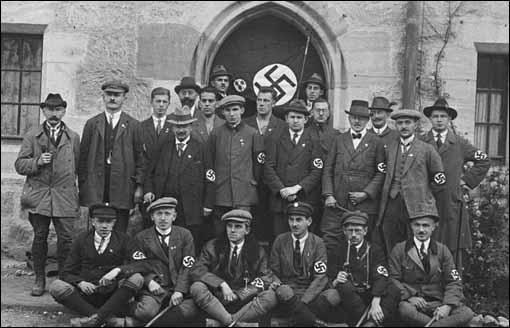
On this day in 1946 Julius Streicher is executed for Nazi war crimes. Streicher founded and edited the racist newspapers, Der Stürmer (1923-45) which he used to build up a deep hatred of the Jewish race. In the newspaper Streicher argued that the Jews were responsible for the depression, unemployment and inflation in Germany. He claimed that Jews were white-slavers and were responsible for over 90 per cent of the prostitutes in the country. Streicher had a low IQ (102) and was considered by many observers to be insane. Despite this his newspaper and his speaking tours made him one of the best known leaders in Nazi Germany. His last words before execution was "Heil Hitler".
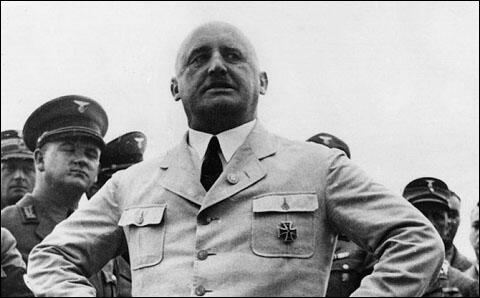
On this day in 1956 John Edward Simkin is killed in a road accident. After his marriage to Muriel Hughes, he was called up for military service on 15 July 1940 and joined the Royal Artillery. He was a member of a team operating an anti-aircraft battery during the Battle of Britain. Later he served at Biggin Hill, Rochford and Dover. He was wounded in 1944 and as a result missed taking part in the D-Day landings.
On this day in 1964 Harold Wilson becomes prime minister for the first time. The Labour Party had been leading the Conservative Party in the monthly Gallup poll from August 1961. After his election as party leader, the lead increased to 15.5 per cent. However, this popularity was undermined when the chancellor, Reginald Maudling, conciliated voters by engineering a pre-election boom through his spring Budget; as a result, although industrial output stagnated and the trade gap widened, people felt more optimistic as the election approached.
Tony Benn, a former television producer, and Marcia Williams, his private secretary, urged Wilson to appear on television as much as possible. Williams later told Michael Cockerell that it was very important to get Wilson on television and "people's homes and to do that you had to be like someone they would know." Wilson "had the sort of background that everyone in those days were aspiring to". By appearing on television "he was on your screen, he was in your home and you could identify with him."
Tom Driberg, became Wilson's unofficial adviser on appearing on television. It was decided to present himself as the common man, in contrast to the untelegenic Sir Alec Douglas-Home. Wilson was always seen with a pipe, though he smoked cigars in private. It was even used in television interviews, as a protective device, and would light his pipe, to give himself more time if he was asked a difficult question. He also wore spectacles, but he made sure he was never photographed or filmed with them on.
In the 1964 General Election the Labour Party obtained a swing of 3% to obtain victory. As Philip Ziegler pointed out: "Fewer people had voted, Labour in 1964 than in I959, even though the electorate was a larger one. A revived Liberal Party had secured some two million extra votes, some from Labour, more from the Tories. The Liberals in a sense had won the election for Harold Wilson. An overall Tory majority of almost a hundred had been overturned, to be replaced by so overall Labour majority of five."
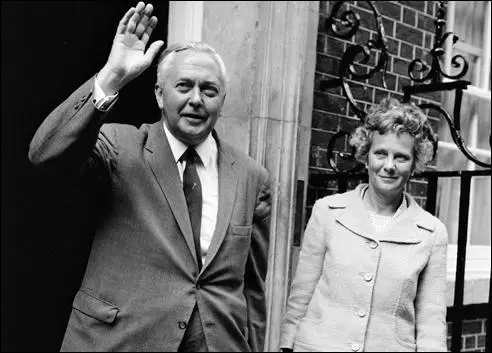
On this day in 1968 – Tommie Smith and John Carlos are ejected from the US Olympic team for participating in the Olympics Black Power salute. Smith won the gold in the 200m final of the 1968 Olympic Games by setting a new world record. Carlos, took the bronze. Both men decided to make a protest. While the Star-Spangled Banner played during the medal ceremony, Smith raised his right, black-gloved fist to represent Black Power, while Carlos's raised left fist represented black unity. Peter Norman, the Australian athlete who won the silver medal, joined the protest by wearing an Olympic Project for Human Rights badge.
At a press conference after the event Tommie Smith said: "If I win I am an American, not a black American. But if I did something bad then they would say 'a Negro'. We are black and we are proud of being black. Black America will understand what we did tonight." Smith admitted he had raised his right fist to represent black power in America, while John Carlos raised his left fist to represent black unity.
The International Olympic Committee president, Avery Brundage, immediately suspended Tommie Smith and John Carlos from the U.S. team and they were both removed from the Olympic Village. When they arrived home they received countless death threats. Australia's conservative media called for Peter Norman to be punished but Julius Patching, his team manager, refused to take action against him.
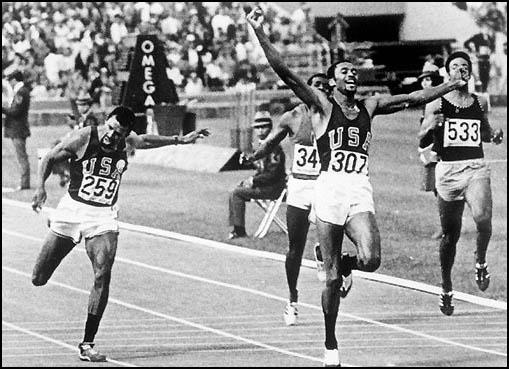
On this day in 1998 former Chilean dictator Augusto Pinochet is arrested in London on a murder extradition warrant. In January 1999 seven Law Lords voted 6-1 that Pinochet must face extradition to Spain but that he was also immune from prosecution for crimes committed before 1988. In January 2000, the British home secretary, Jack Straw, gave permission for Augusto Pinochet to fly home to Chile on compassionate grounds.
In 1970 Salvador Allende, the leader of the Chilean Socialist Party, was elected president. He therefore became the first Marxist in the world to gain power in a free democratic election. He attempted to build a socialist society but was opposed by business interests. Allende's decide to take action to redistribute wealth and land in Chile. Wage increases of around 40 per cent were introduced. At the same time companies were not allowed to increase prices. The copper industry was nationalized. So also were the banks.
The CIA arranged for Michael V. Townley to be sent to Chile under the alias of Kenneth W. Enyart. He was accompanied by Aldo Vera Serafin of the Secret Army Organization (SAO). Townley now came under the control of David Atlee Phillips who had been asked to lead a special task force assigned to remove Allende. The CIA attempted to persuade Chile's Chief of Staff General Rene Schneider, to overthrow Allende. He refused and on 22nd October, 1970, his car was ambushed. Schneider drew a gun to defend himself, and was shot point-blank several times. He was rushed to hospital, but he died three days later.
Allende's attempts to build a socialist society was opposed by business interests. Later, Henry Kissinger admitted that in September 1970, President Richard Nixon ordered him to organize a coup against Allende's government. A CIA document written just after Allende was elected said: "It is firm and continuing policy that Allende be overthrown by a coup" and "it is imperative that these actions be implemented clandestinely and securely so that the USG (United States government) and American hand be well hidden."
Salvador Allende appointed Augusto Pinochet as commander-in-chief of the Chilean Army. Allende was unaware that Pinochet was plotting with the CIA to remove him from power. On 11th September 1973, Pinochet led a military coup against Allende's government. Allende died in the fighting in the presidential palace in Santiago. Pinochet immediately closed down the Chilean Parliament, suspended the constitution, banned all political and trade union activity and imposed strict controls over the media. Pinochet, who had appointed himself president, ordered a purge of the left in Chile.
Over the next few years more than 3,000 supporters of the Allende regime were killed. People in positions of authority who were suspected of holding liberal opinions were also removed from power. It is estimated that around 10 per cent of the Chilean judiciary were dismissed during this period. Pinochet was also responsible for thousands of people being tortured and large numbers were forced into exile.
